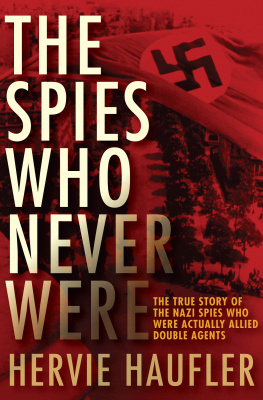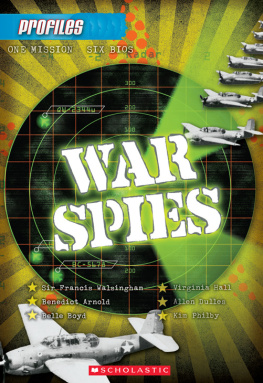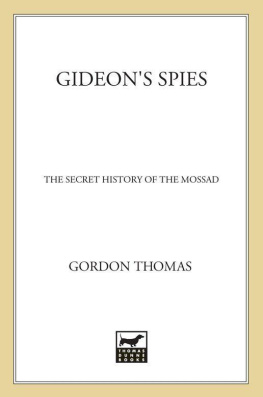Vikas Khatri - World Famous Spies & Spymasters
Here you can read online Vikas Khatri - World Famous Spies & Spymasters full text of the book (entire story) in english for free. Download pdf and epub, get meaning, cover and reviews about this ebook. year: 2011, publisher: ePub Direct;Pustak Mahal, genre: Non-fiction. Description of the work, (preface) as well as reviews are available. Best literature library LitArk.com created for fans of good reading and offers a wide selection of genres:
Romance novel
Science fiction
Adventure
Detective
Science
History
Home and family
Prose
Art
Politics
Computer
Non-fiction
Religion
Business
Children
Humor
Choose a favorite category and find really read worthwhile books. Enjoy immersion in the world of imagination, feel the emotions of the characters or learn something new for yourself, make an fascinating discovery.

- Book:World Famous Spies & Spymasters
- Author:
- Publisher:ePub Direct;Pustak Mahal
- Genre:
- Year:2011
- Rating:3 / 5
- Favourites:Add to favourites
- Your mark:
- 60
- 1
- 2
- 3
- 4
- 5
World Famous Spies & Spymasters: summary, description and annotation
We offer to read an annotation, description, summary or preface (depends on what the author of the book "World Famous Spies & Spymasters" wrote himself). If you haven't found the necessary information about the book — write in the comments, we will try to find it.
The most comprehensive work on the subject ever written, World Famous Spies & Spymasters endeavours to cover the entire history of espionage through many famous spies and spymasters across the world.
World Famous Spies & Spymasters — read online for free the complete book (whole text) full work
Below is the text of the book, divided by pages. System saving the place of the last page read, allows you to conveniently read the book "World Famous Spies & Spymasters" online for free, without having to search again every time where you left off. Put a bookmark, and you can go to the page where you finished reading at any time.
Font size:
Interval:
Bookmark:
Sandor Rado
Hungarian Cartographer who Spied on the Nazis for the Soviet Union
B orn Alexander Radolfi in Budapest, Hungary, Sandor Rado, the son of a wea lthy businessman, attended the University of Budapest, where he joined the Communist Party in 1919.
He took part in a revolutionary coup against the Hungarian government but the coup was put down quickly and Rado fled to Russia. He married fellow Communist Helene Jensen while in exile in Russia.
He was trained by the NKVD in 1931 and was assigned to a post in Berlin, Germany, working under the cover of a clerk in the Russian Embassy. He provided information on the strengthening position of the Nazi Party in Berlin and helped to organise demonstrations and violent uprisings against the Nazis by Communist Party members and a housewife, Howard Hansen who was part of a special division called the Red Unit, created to ferret out communist sympathisers during the Red Scare.
Fled to Paris, France to avoid capture (and probable execution) by Nazi hit squads (as a Jew and a Communist leader, he was specifically targeted). He created a publishing company called Geopress in Paris, which served as a cover for his Soviet spymaster activities.
He joined the GRI in 1936 and was posted in Switzerland, serving as Resident Director for Soviet intelligence within the country. Rado built a very successful network of spies named DORA. Members of his network included Ruth Kuczynski, Alexander Foote and Rachel Duebendorfer. Foote was actually a British agent, but he helped to feed information to Rado because the Soviet Union was an ally against Germany in World War II.
The DORA spy ring provided information to the Soviet Union about German military troop alignment. Some of this information was obtained from Rudolf Roessler, who ran the Lucy Spy Ring. Rado was not aware of his identity as Rado preferred to work through cut-outs. They provided detailed information regarding a German invasion of Russia. Despite having supporting information from another Soviet spy Richard Sorge, Soviet dictator Josef Stalin refused to believe that Hitler in fact planned such an invasion.
Rado was highly praised for the sophistication of his network and the level of reliability and detail of the information provided. Without the knowledge of Rado and the Soviet, much of the prized information was coming from the British, through Foote. The British had broken the Enigma code and therefore could read detailed German messages. Britain, however, did not want the Soviets to know they had broken enigma and thus passed information to Moscow through Foote.
Foote passed along additional detailed information proving that the German Army was going to launch another attack against Russia. The information was so detailed that Stalin relied on it this time and successfully defended itself from the Nazi onslaught.
Although he ran his spy network exceptionally well, Rado was known to drink too much and often made himself conspicuous through his lavish spending habits. Unknown to Rado, two of his agents were actually Nazi spies, passing along information to the German high command. Germany, therefore, threatened neutral Switzerland, demanding that the Swiss government arrest Rado and his entire spy network. Because the presence of the DORA spy ring had become so conspicuous, Switzerland felt it had no choice but to arrest members of the ring, lest Germany take military action.
After fleeing to France, Rado was ordered back to Moscow to explain how the DORA spy ring was shut down. Rado panicked, thinking he would be blamed for the failure and therefore put to death. Upon making a stopover in Cairo, Egypt, he fled from his companions and was found later hiding in a hotel room. He was immediately forced back to Moscow. Although he was believed to have been executed, Rado surfaced in 1955 in Budapest, where he was teaching cartography at Budapest University.
He died on August 20, 1981.
Alfred Redl
Austrian Head of Counterintelligence Blackmailed by Russia into Passing Secrets
B orn in 1864, t he son of a poor Austrian railroad official and one of 14 children, Alfre d Redl rose to fame on his own.
He attended Lemberg Cadet School, a military academy and graduated in 1882. He received a commission in the Austrian Army. He was noted for his abilities with different languages. In 1889, he was assigned to serve as a military observer, accompanying the Russian Army. He made a number of friendship and contacts among the Russians.
He was continually promoted until he reached the rank of Colonel. At this point, he was placed in the Austrian Military Counterintelligence Corps. In 1900, he was named the head of the Kundschaftsstelle, the Austrian espionage and counterespionage service. He immediately set to work modernising the service, implementing new technologies as well as new methods for obtaining intelligence. Within his office, he often collected information on his visitors, obtaining their fingerprints b y way of a special powder on the arms of their chair.
He also photogr aphed and recorded the conversations of visitors to his office. He introduced a new method of interrogation, where he shined lights directly in a suspects eye while questioning him this he called the third degree.
He was a homosexual, a fact that was kept a secret from any of his colleagues and superiors. He visited many of the most scandalous homosexual haunts throughout Europe. It is presumed that his homosexuality was discovered by the Russians and that they enticed him with young male lovers and then blackmailed him into providing information. At the same time, in addition to providing him with companions, they also paid him handsomely for providing them with secret information from the Austrian government.
Redl grew to possess lavish tastes and the funding from the Russians helped to afford him the lifestyle he desired. He revealed to the Russians identities of Austrian spies working in Russia as well as secret codes. In 1902, he provided the Russians with Austrias contingency plans in case of a war. The Austrian Foreign Office became aware that their contingency plans had fallen in the hands of the Russians, but had no idea who had delivered the plans. General Baron von Giesl turned the matter over to Redl, the Chief of Counterespionage. Redl was in the awkward position of having to conduct a search for himself. He advised his Russian contacts of his dilemma and not wanting to lose such a valuable information resource, they gave a list of less important Austrians spying for Russia. Redl then exposed these agents, thus becoming a hero of the Austrian intelligence community.
He was promoted to head of all espionage efforts in Austria in 1907. In his position, conferred with intelligence officers from other nations, often discussing secret information with friendly allies, and then passing this information along to the Russians. He was promoted again in 1912 to the position of Chief of Staff to General von Giesl. Giesl headed up the Army Corps then in Prague. Redl quickly passed along information about Giesls troops to his Russian contacts. For his treachery, Redl was well rewarded. He used his ill gotten gains to purchase several houses in Vienna as well as a palatial estate outside the city. He purchased several of the most expensive cars in the world and a huge mansion in Prague, complete with an assembly of some of the finest champagne in the world.
On March 2, 1913, two letters, identically addressed were delivered to a postal box in Vienna. When nobody claimed them, they were returned to the post office in East Prussia from which they had been sent. The letters were sent back to Austria, this time to Redls successor a Chief of Counterintelligence Maximilian Ronge. They were sent to him by the head of German counterintelligence Walther Nicholai who found them to contain large sums of money, with no letters accompanying them. Ronde recognised that the letters had originated from Eydtkuhnen, an area of East Prussia known for Russian espionage. Sensing that the money might be a payoff to a spy, he took the money back to the Vienna Post Office. He installed a button at the post office which rang through to the police station nearby. He instructed the postal clerks to push the buzzer if anyone came in to retrieve the letter.
Font size:
Interval:
Bookmark:
Similar books «World Famous Spies & Spymasters»
Look at similar books to World Famous Spies & Spymasters. We have selected literature similar in name and meaning in the hope of providing readers with more options to find new, interesting, not yet read works.
Discussion, reviews of the book World Famous Spies & Spymasters and just readers' own opinions. Leave your comments, write what you think about the work, its meaning or the main characters. Specify what exactly you liked and what you didn't like, and why you think so.






